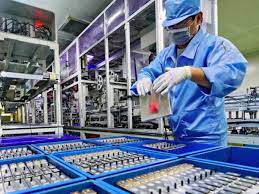The long-awaited guidelines, which would restrict the amount of Chinese content in batteries eligible for electric vehicle tax credits beginning next year, were released by the Biden administration on Friday.
The U.S. Treasury will temporarily exempt some trace key minerals from more stringent regulations that prohibit supplies from China and other nations classified as “Foreign Entities of Concern,” which is a victory for the auto industry. (FEOC)
Automakers are keenly monitoring the new regulations, which are mandated by a law enacted in August 2022, as they decide how much money to invest in producing batteries in their shift to electric vehicles. The goal of the regulations is to gradually wean the American electric vehicle battery chain away from China.
For finished batteries, the FEOC regulations take effect in 2024, while for essential minerals utilized in their production, they do so in 2025.
Nearly all of the major manufacturers are represented by the Alliance for Automotive Innovation, which noted that the decision to exempt trace materials for two years “was significant and well-advised” and that it could have rendered almost all vehicles ineligible had it not been made.
According to the Treasury, less than 2% of the value of battery-critical minerals is made up of a few exempt resources.
As part of the automaker’s proposed Michigan battery factory, Ford Motor announced in October that it was awaiting instructions to ascertain whether its licensing deal with Chinese battery company CATL would violate any regulations.
According to the Energy Department, a business that is owned or controlled by a specified foreign government would be considered an FEOC. Additionally, if a concerned entity owns 25% of a company’s equity, voting rights, or board seats, the company will not be qualified.
These nations are Iran, China, Russia, and North Korea.
“It seems that companies operating in China are considered FEOC,” the automobile group stated. Under some conditions, Chinese entities with particular ownership or governance forms may be allowed.”
It is anticipated that the regulations will further decrease the quantity of electric cars that qualify for EV tax credits. As soon as possible, the law excluded any car that was not built in North America. New criteria for battery and mineral sourcing went into force earlier this year, with pricing and buyer income eligibility caps starting on January 1.
Earlier this month, Joe Manchin, the chair of the Senate Energy Committee, urged Treasury to implement the “strictest possible standards.” Manchin pointed out that China produced 74% of the cathodes, 92% of the anodes, and 76% of the lithium-ion battery cells produced worldwide.
The Treasury stated that it will have an expedited compliance approach for automakers with clean supply chains, allowing compliant vehicles to qualify until the rules are finalized.


















